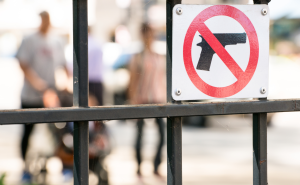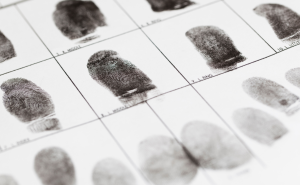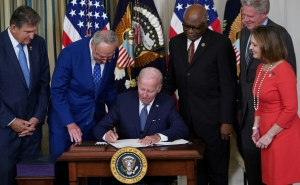New Report Finds that Baltimore’s Community Violence Intervention Program Safe Streets Reduced Gun Violence
Analyses show that some sites did not see reductions in gun violence.

Safe Streets Baltimore, a community violence intervention program focused on reducing gun violence, reduced homicides and nonfatal shootings overall from 2007 to 2022, according to a new analysis from the Center for Gun Violence Solutions at the Johns Hopkins Bloomberg School of Public Health.
The researchers found that in these five longest-running sites, homicides were, on average, 32 percent lower in the first four years of program implementation, but there was no significant change in homicides in the six newer program sites. Safe Streets was associated with a 23 percent reduction in nonfatal shootings across the full implementation period in all 11 sites analyzed in the report.
The program was associated with reductions in homicides in 8 of the 11 sites studied with statistically significant reductions in four sites (Lower Park Heights, Cherry Hill, McElderry Park, Penn North). One site (Brooklyn) showed a statistically significant increase in homicides. Similarly, Safe Streets was associated with reductions in nonfatal shootings in 8 of the 11 sites studied. Four had statistically significant reductions (Lower Park Heights, Penn North, Woodbourne-McCabe, Franklin Square) and one had a statistically significant increase (Belvedere).
The report, “Estimating the Effects of Safe Streets Baltimore on Gun Violence,” was released on March 30, 2023.
Community violence intervention programs like Safe Streets Baltimore are designed to reduce gun violence in the most impacted neighborhoods through outreach by credible messengers who work with individuals at risk for involvement in gun violence. The messengers mediate disputes that could lead to violence and refer program participants to social services and other supports to lower their risks. Established in 2007, Safe Streets Baltimore currently operates in 10 neighborhoods that have long experienced structural racism, chronic disinvestment, and high rates of gun violence.
“Gun violence has taken an enormous toll on Baltimore, leaving communities traumatized, and weakened the local economy,” says Daniel Webster, ScD, MPH, Distinguished Research Scholar at the Bloomberg School’s Center for Gun Violence Solutions, and the report’s lead author. “The findings from this study show that when programs like Safe Streets are properly implemented and adequately funded, they can significantly reduce gun violence in the most impacted neighborhoods.”
The study analyzed monthly counts of homicides and nonfatal shootings across 11 Safe Street sites over 19 years, from January 2003 through July 2022, using information from the Baltimore Police Department and the Mayor’s Office of Neighborhood Safety and Engagement. Using advanced statistical modeling, the researchers estimated what would have happened if Safe Streets had not been implemented. The analysis involved weighting data from comparison neighborhoods that did not implement Safe Streets to minimize prediction error in trends for gun violence in areas served by Safe Streets.
Previous research on community violence intervention programs usually shows favorable outcomes, but program effects can vary significantly across sites and over time. The same was true in this study of Safe Streets.
“The varied effects across sites and over different time periods underscore the need for more research on the keys to effective implementation and conditions that either strengthen or constrain the protective effects of Safe Streets,” says Webster. “The insights and expertise of frontline staff will be vital to this next stage of research.”
“Programs like Safe Streets are becoming more integral in the public safety landscape,” says Carla Tilchin, MSPH, a PhD candidate at the Bloomberg School and lead analyst on the report. “We need to better understand the complexities of violence dynamics and the best ways to support the individuals doing this work.”
Tilchin plans to conduct follow-up research with Safe Streets frontline workers to assess what is underlying these mixed program effects.
The study was funded by the Mayor’s Office for Neighborhood Safety and Engagement for Baltimore City.
“Estimating the Effects of Safe Streets Baltimore on Gun Violence” was written by Daniel Webster, Carla Tilchin, and Mitchell Doucette.





